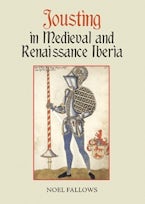
Anatomy of a Duel in Jacobean England
Gentry Honour, Violence and the Law
- Description
- Contents
- Author
- Reviews
Throws much new light on questions of gentry honour, the nature and prevalence of early modern elite violence, and the process of judicial investigation in Shakespeare's England
This book offers an analysis of Jacobean duelling and gentry honour culture through the close examination and contextualisation of the most fully documented duel of the early modern era. This was the fatal encounter between a Flintshire gentleman, Edward Morgan, and his Cheshire antagonist, John Egerton, which took place at Highgate on 21 April 1610. John Egerton was killed, but controversy quickly erupted over whether he had died in a fair fight of honour or had been murdered in a shameful conspiracy. The legal investigation into the killing produced a rich body of evidence which reveals in unparalleled detail not only the dynamics of the fight itself, but also the inner workings of a seventeenth-century metropolitan manhunt, the Middlesex coroner's court, a murder trial at King's Bench, and also the murky webs of aristocratic patronage at the Jacobean Court which ultimately allowed Morgan to secure a pardon.
Uniquely, a series of dramatic Star Chamber suits have survived that also allow us to investigate the duel's origins. Their close examination, as Lloyd Bowen shows, calls into question the historiographical paradigm which sees early modern duels as matters of the moment and distinct from, as opposed to connected to, the gentry feud. The book throws much new light on questions of gentry honour, the nature and prevalence of early modern elite violence, and the process of judicial investigation in Shakespeare's England.
This book offers an analysis of Jacobean duelling and gentry honour culture through the close examination and contextualisation of the most fully documented duel of the early modern era. This was the fatal encounter between a Flintshire gentleman, Edward Morgan, and his Cheshire antagonist, John Egerton, which took place at Highgate on 21 April 1610. John Egerton was killed, but controversy quickly erupted over whether he had died in a fair fight of honour or had been murdered in a shameful conspiracy. The legal investigation into the killing produced a rich body of evidence which reveals in unparalleled detail not only the dynamics of the fight itself, but also the inner workings of a seventeenth-century metropolitan manhunt, the Middlesex coroner's court, a murder trial at King's Bench, and also the murky webs of aristocratic patronage at the Jacobean Court which ultimately allowed Morgan to secure a pardon.
Uniquely, a series of dramatic Star Chamber suits have survived that also allow us to investigate the duel's origins. Their close examination, as Lloyd Bowen shows, calls into question the historiographical paradigm which sees early modern duels as matters of the moment and distinct from, as opposed to connected to, the gentry feud. The book throws much new light on questions of gentry honour, the nature and prevalence of early modern elite violence, and the process of judicial investigation in Shakespeare's England.
Introduction
Fathers, Sons and Kinsmen: The Morgans and the Egertons
A 'Great Styrre & Adoe': The Talacre Inheritance Dispute, 1606-8
Challenges Offered and Declined, 1608
The Duel in Elizabethan and Jacobean England and Wales
Honour, Gentility and Violence: Highgate, 21 April 1610
Corruption, Conspiracy and the Coroners
Shifting Perspectives: Murder and Manslaughter in the Highgate Duel
Jurors, Politics and Pardons: The Trial at King's Bench, 1610-11
Epilogue(s)
Conclusion
Appendix 1: Timeline of the Morgan-Egerton Conflict
Appendix 2: Jurors in King's Bench for the Trial of Edward Morgan
Bibliography
Fathers, Sons and Kinsmen: The Morgans and the Egertons
A 'Great Styrre & Adoe': The Talacre Inheritance Dispute, 1606-8
Challenges Offered and Declined, 1608
The Duel in Elizabethan and Jacobean England and Wales
Honour, Gentility and Violence: Highgate, 21 April 1610
Corruption, Conspiracy and the Coroners
Shifting Perspectives: Murder and Manslaughter in the Highgate Duel
Jurors, Politics and Pardons: The Trial at King's Bench, 1610-11
Epilogue(s)
Conclusion
Appendix 1: Timeline of the Morgan-Egerton Conflict
Appendix 2: Jurors in King's Bench for the Trial of Edward Morgan
Bibliography
"A rich narrative that does much to inform the recent historiography of the relationship between aristocratic notions of honour and elite violence in early modern societies....Lloyd Bowen should be congratulated for making such a substantial contribution to the literature on duelling, litigation, masculinity, and elite honour culture more broadly. The book will be admired by scholars in the field for years to come." MIDLAND HISTORY
"This microhistory is an impressive deep dive into the thick documentation and surrounding
historical contexts of a single event... Of particular value is Bowen's treatment of the significant questions of manslaughter and murder in homicide trials, and how the English common law determined those categories. I heartily recommend this book to all scholars of European violence, the law, and elite social relationships. Bowen has written a thorough microhistory in the best sense, reaching from a single event to a much broader constellation of important historical issues." RENAISSANCE QUARTERLY
Hardcover
9781783276097
June 2021
£75.00 / $115.00
Ebook (EPUB)
9781800101197
June 2021
£24.99 / $29.95
Ebook (EPDF)
9781800101180
June 2021
$29.95 / £24.99










